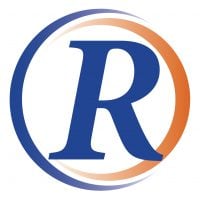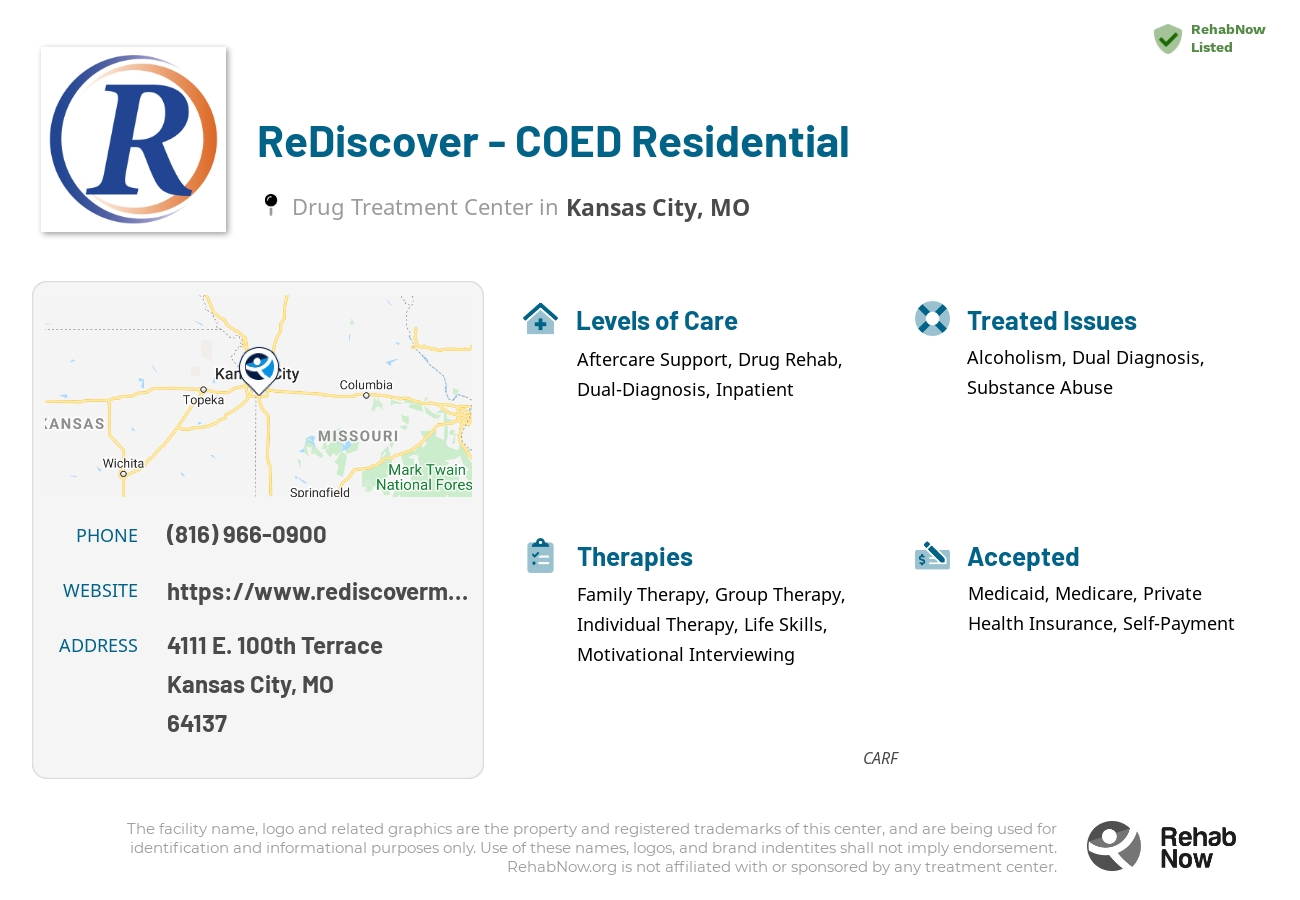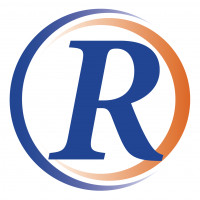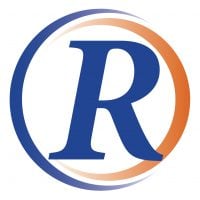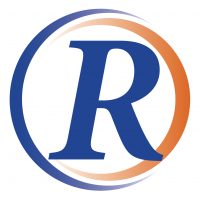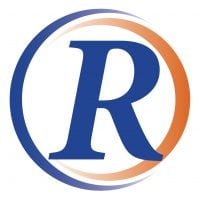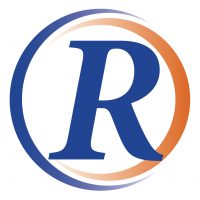ReDiscover - COED Residential
Drug Rehab Center in Kansas City, Missouri
ReDiscover - COED Residential in Kansas City, Missouri is an accredited addiction treatment facility that offers personalized treatment plans and resources for individuals struggling with addiction and substance abuse, including dual diagnosis treatments and evidence-based therapies, in a safe and secure environment supported by a team of experienced professionals.
About This Missouri Facility
ReDiscover - COED Residential in Kansas City, Missouri is an addiction treatment facility that offers individuals suffering from addiction and substance abuse help and support. Their extensive services provide a full continuum of care, including aftercare and residential services in a safe, secure environment. They are accredited by CARF, the highest accreditation for addiction treatment facilities. They also accept private health insurance, and are affiliated with ReDiscover - a nationally recognized addiction treatment provider.
ReDiscover - COED Residential helps individuals tackle their addiction and substance abuse issues with personalized treatment plans and resources. This includes dual diagnosis treatments for those dealing with both a mental health disorder and substance abuse, as well as a variety of evidence-based therapies. They also offer inpatient and residential levels of care, depending on individual need and situation. In addition, their team of experienced professionals provides both individual and group counseling, as well as intensive case management and aftercare support. Their holistic approach to addiction treatment ensures that each individual will have a unique program tailored to their needs and goals.
Genders
Ages
Modality
Additional
Accreditations

CARF
The Commission on Accreditation of Rehabilitation Facilities (CARF) is a non-profit organization that specifically accredits rehab organizations. Founded in 1966, CARF's, mission is to help service providers like rehab facilities maintain high standards of care.
Conditions and Issues Treated
People who abuse drugs are likely to suffer from an addiction, which can cause serious health problems. When it comes to helping drug abusers get sober, there are many options to choose from. It is essential to state that there is no “”correct”” way of doing things. People are different, and they need different types of help to get over their addiction.
Dual Diagnosis refers to someone who is both dealing with addiction and another mental health issue.
There are different kinds of Dual Diagnosis: A person who simultaneously experiences both a mental illness and an addiction disorder. Or, a person who experiences one or more coexisting (simultaneous) mental health conditions in addition to a primary substance use disorder.
Some conditions that commonly co-occur with addiction include:
- Personality Disorders (Borderline, Narcissistic)
- Mood Disorders (Bipolar Disorder, Depression, Anxiety Disorder)
- PTSD (Post Traumatic Stress Disorder), OCD (Obsessive Compulsive Disorder), ADHD (Attention Deficit Hyperactivity Disorder)
- Schizophrenia, Psychosis, Hallucinations, Delusions
Levels of Care Offered at ReDiscover - COED Residential
This center offers a variety of custom treatment tailored to individual recovery. Currently available are Aftercare Support, Drug Rehab, Dual-Diagnosis, Inpatient, Residential, with additional therapies available as listed below.
Individuals who are suffering from severe addiction or have a high risk for dangerous health concerns are often recommended to receive inpatient treatment.
Choosing to enter an inpatient treatment program is beneficial for people who are suffering from severe addiction, or who have a high risk for dangerous health concerns.
Inpatient treatment is beneficial for:
- People who have a history of severe withdrawal.
- People who have attempted to overcome addiction on their own without success.
- People who have a history of relapse, or have recently relapsed.
- People at risk for drug overdose or withdrawal-related complications.
- People with medical conditions that are worsened by drug or alcohol use.
Residential treatment programs are those that offer housing and meals in addition to substance abuse treatment. Rehab facilities that offer residential treatment allow patients to focus solely on recovery, in an environment totally separate from their lives. Some rehab centers specialize in short-term residential treatment (a few days to a week or two), while others solely provide treatment on a long-term basis (several weeks to months). Some offer both, and tailor treatment to the patient’s individual requirements.
People who have completed a rehab program often need continued support from the addiction treatment team in order to remain abstinent from drugs and alcohol. Aftercare can be beneficial for personal, social, and emotional growth.
Common aftercare options include:
- Individual Therapy – this type of addiction counseling is available on a one-on-one basis. This can be beneficial for people with a high degree of emotional turmoil and a strong desire to overcome addiction.
- Group Therapy – this type of addiction counseling is available in a group setting. This type of treatment can be beneficial for people who are unable to attend regular therapy appointments due to other responsibilities.
- Family Therapy – this type of addiction counseling is available to the family members of addicts. This can be beneficial for people who are unable to fully comprehend what their loved ones are experiencing due to addiction.
Therapies & Programs
Therapy sessions focused on the individual addict can provide much-needed guidance as they work toward overcoming their addiction. These types of sessions typically involve guidance from a therapist, who will help addicts identify and process their feelings and cravings.
During these sessions, addicts may develop plans for coping with the triggers that typically lead to relapse and learn how to avoid those triggers during their recovery process.
The main goal of family therapy for drug addiction is to create an environment where communication can occur without judgment, hostility, or blame that often occurs within a family.
Family therapy is a type of group problem-solving that aims to improve communication and relationships between the patient, their family, and sometimes friends. The therapist is with the family as they learn to communicate with each other differently, especially with the addict when s/he is using.
The family can learn to reduce their enabling behavior or rally together and support each other during tough times. The patient also learns how to deal with their addiction and maintain sobriety while interacting with the family.
Different types of addiction treatment services are available. Within this article, group therapy is of interest due to its high success rate compared to individual therapy. Group therapy settings are beneficial because they allow recovering addicts to build a strong support network.
Benefits of group therapy are:
- Reduces feelings of isolation
- Immediate access to social support in the form of fellow addicts in recovery
- Lowers risk of relapse
- Increases rate of sobriety
- Builds coping skills that can be applied to everyday life
Those struggling with addiction in Missouri can benefit from learning certain life skills. It is not as simple as quitting drinking or taking drugs and thinking that the hard part is over. Being sober means living a whole new way of life. Many recovering addicts have found that they need to develop talents like time management, organization, communication skills, socialization skills, and self-esteem to make their life in sobriety work.
Drug and alcohol addiction can lead to a breakdown in life skills. Learning certain life skills can help those who are struggling with addiction. Life skills training at ReDiscover - COED Residential in Kansas City, MO teaches patients skills such as time management, budgeting, and social abilities to improve their quality of life and prevent relapse.
An addict’s life skills are maladaptive, meaning they are counterproductive. An addict may have learned poor time management skills growing up, have a hard time budgeting money, or be socially awkward. An addict’s poor life skills can lead to relapse and the inability to achieve long-term sobriety. Life skills training teaches patients effective coping mechanisms, which can help them live a clean and sober life.
Payment Options Accepted
For specific insurance or payment methods please contact us.
Is your insurance accepted?
Ask an expert, call (888) 674-0062
ReDiscover Associated Centers
Discover treatment facilities under the same provider.
- ReDiscover in Lees Summit, MO
- ReDiscover - NE Rice Road in Lees Summit, MO
- ReDiscover - Independence Avenue in Lees Summit, MO
- ReDiscover - Loma Vista in Kansas City, MO
- ReDiscover - Woodland in Kansas City, MO
Learn More About ReDiscover Centers
Additional Details
Specifics, location, and helpful extra information.
Kansas City, Missouri 64137 Phone Number(816) 966-0900 Meta DetailsUpdated November 25, 2023
Staff Verified
Patient Reviews
There are no reviews yet. Be the first one to write one.
Kansas City, Missouri Addiction Information
Opioid-related overdoses in Missouri have been increasing steadily for the past three decades. In 2018, more than 1,130 people in Missouri died from opioid abuse. Methamphetamines and marijuana abuse have surpassed opioid abuse in Missouri. Missouri is the number 1 methamphetamine manufacturer in the country with more than 27 meth labs per 100,000 people.
In Kansas City, Missouri, in 2016, there were 97 drug overdose deaths. There were 438 drug-related deaths in Kansas City in 2017, and that number is expected to rise in 2018. Drug addiction not only takes a toll on the individual but the entire community. Kansas City, MO, offers various drug treatment options for those looking to get sober. People who require around-the-clock assistance can enroll in these programs.
Treatment in Nearby Cities
- Bridgeton, MO (222.7 mi.)
- Hayti, MO (322.5 mi.)
- Steele, MO (325.4 mi.)
- Hillsboro, MO (220.6 mi.)
- Marshfield, MO (142.2 mi.)
Centers near ReDiscover - COED Residential
The facility name, logo and brand are the property and registered trademarks of ReDiscover - COED Residential, and are being used for identification and informational purposes only. Use of these names, logos and brands shall not imply endorsement. RehabNow.org is not affiliated with or sponsored by ReDiscover - COED Residential.
